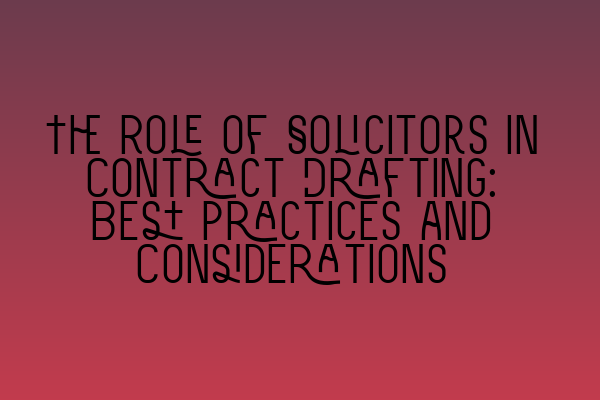THE ROLE OF SOLICITORS IN CONTRACT DRAFTING: BEST PRACTICES AND CONSIDERATIONS
Introduction:
When it comes to drafting contracts, it is essential to have the guidance and expertise of a skilled solicitor to ensure that the agreement is legally sound and provides adequate protection for all parties involved. In this blog post, we will explore the vital role that solicitors play in contract drafting, highlighting best practices and key considerations.
What Does a Solicitor Do in Contract Drafting?
1. Understanding the Parties and their Objectives:
One of the crucial initial steps for a solicitor is to thoroughly understand the parties involved in the contract and their specific objectives. This involves conducting comprehensive interviews with the clients to grasp their expectations, requirements, and any unique circumstances surrounding the agreement.
2. Identifying the Applicable Legal Standards:
A solicitor should have in-depth knowledge of contract law and stay updated with relevant legal standards. This understanding enables them to identify the specific legal principles and regulations that apply to the contract at hand. By doing so, solicitors ensure that the contract is compliant with the current legal framework.
3. Crafting Clear and Concise Terms:
Clear and concise contract terms are essential to avoid ambiguity and potential disputes. Solicitors have the drafting skills to articulate complex legal concepts in a way that is easy to understand and does not leave room for misinterpretation. This is particularly important when dealing with technical or industry-specific contracts.
4. Addressing All Necessary Provisions:
Solicitors ensure that all necessary provisions are included in the contract to safeguard the interests of their clients. This may involve addressing issues such as payment terms, delivery schedules, confidentiality clauses, dispute resolution mechanisms, warranties, and indemnities. By carefully considering all relevant provisions, solicitors contribute to the overall effectiveness of the contract.
5. Tailoring the Contract to Specific Circumstances:
Each contract is unique and requires a personalized approach. Solicitors take into account the specific circumstances of their clients and adjust the terms of the contract accordingly. This ensures that the agreement adequately reflects the intentions and expectations of the parties.
Best Practices in Contract Drafting:
1. Use Clear and Precise Language:
To minimize ambiguity and potential disputes, solicitors should use clear and precise language when drafting contracts. Ambiguous terms can lead to differing interpretations and jeopardize the enforceability of the agreement.
2. Thoroughly Review and Edit:
A comprehensive review and editing process is essential in contract drafting. Solicitors should carefully proofread the contract to eliminate errors, ensure consistency, and refine the language for clarity. Attention to detail is critical to maintaining the integrity of the agreement.
3. Ensure Compliance with Applicable Laws:
Solicitors must ensure that the contract complies with all relevant laws and regulations. This may include statutory requirements, industry-specific regulations, and any legal precedent that may impact the agreement. Compliance is crucial to protect the parties from potential legal consequences.
Key Considerations in Contract Drafting:
1. Define and Allocate Risks:
Contracts should clearly define and allocate risks between the parties involved. This includes identifying potential liabilities, insurance requirements, limitations of liability, and indemnification clauses. By effectively addressing risks, solicitors help mitigate future disputes and protect their clients.
2. Consider Dispute Resolution Mechanisms:
Dispute resolution mechanisms, such as arbitration or mediation clauses, should be carefully considered and incorporated into the contract. Solicitors should assess the nature of the agreement and advise on the most appropriate mechanism to resolve any potential conflicts that may arise.
3. Confidentiality and Non-Disclosure:
In contracts involving sensitive information or proprietary rights, solicitors must ensure the inclusion of comprehensive confidentiality and non-disclosure provisions. These provisions safeguard confidential information and prevent unauthorized use or disclosure.
Conclusion:
The role of solicitors in contract drafting is crucial to ensure that legal agreements are professionally executed, protecting the interests of all parties involved. By following best practices and considering all relevant factors, solicitors contribute to the clarity, enforceability, and overall integrity of the contract. Engaging a solicitor in the contract drafting process is an investment in avoiding potential future disputes and securing the rights and obligations of the parties.
